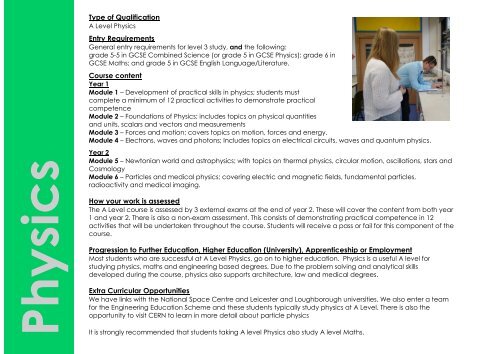Sixth Form Options Booklet 2019-21
Create successful ePaper yourself
Turn your PDF publications into a flip-book with our unique Google optimized e-Paper software.
Physics<br />
Type of Qualification<br />
A Level Physics<br />
Entry Requirements<br />
General entry requirements for level 3 study, and the following:<br />
grade 5-5 in GCSE Combined Science (or grade 5 in GCSE Physics); grade 6 in<br />
GCSE Maths; and grade 5 in GCSE English Language/Literature.<br />
Course content<br />
Year 1<br />
Module 1 – Development of practical skills in physics; students must<br />
complete a minimum of 12 practical activities to demonstrate practical<br />
competence<br />
Module 2 – Foundations of Physics; includes topics on physical quantities<br />
and units, scalars and vectors and measurements<br />
Module 3 – Forces and motion; covers topics on motion, forces and energy.<br />
Module 4 – Electrons, waves and photons; Includes topics on electrical circuits, waves and quantum physics.<br />
Year 2<br />
Module 5 – Newtonian world and astrophysics; with topics on thermal physics, circular motion, oscillations, stars and<br />
Cosmology<br />
Module 6 – Particles and medical physics; covering electric and magnetic fields, fundamental particles,<br />
radioactivity and medical imaging.<br />
How your work is assessed<br />
The A Level course is assessed by 3 external exams at the end of year 2. These will cover the content from both year<br />
1 and year 2. There is also a non-exam assessment. This consists of demonstrating practical competence in 12<br />
activities that will be undertaken throughout the course. Students will receive a pass or fail for this component of the<br />
course.<br />
Progression to Further Education, Higher Education (University), Apprenticeship or Employment<br />
Most students who are successful at A Level Physics, go on to higher education. Physics is a useful A level for<br />
studying physics, maths and engineering based degrees. Due to the problem solving and analytical skills<br />
developed during the course, physics also supports architecture, law and medical degrees.<br />
Extra Curricular Opportunities<br />
We have links with the National Space Centre and Leicester and Loughborough universities. We also enter a team<br />
for the Engineering Education Scheme and these students typically study physics at A Level. There is also the<br />
opportunity to visit CERN to learn in more detail about particle physics<br />
It is strongly recommended that students taking A level Physics also study A level Maths.


